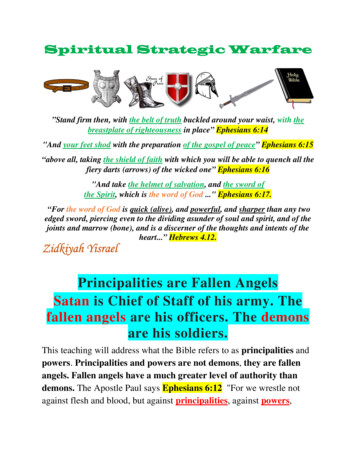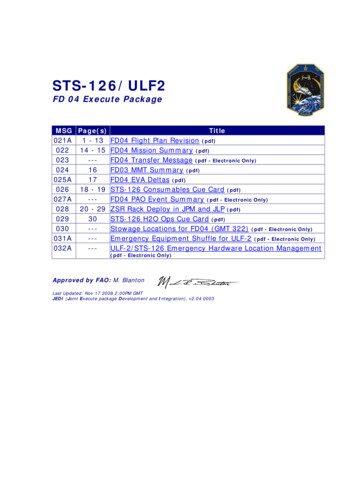
Transcription
To purchase the accompanying PowerPoint and Instructor’s Guide ( 20), or toorder printed /angels.htmTo access this .pdf file on the Web dfAngels: In the Bible, the Apocrypha &the Dead Sea ScrollsWritten by Robert JonesAcworth, Georgia 2001 Robert C. Jones
Christian Theology and History Adult Sunday School CoursesRobert Joneswww.sundayschoolcourses.comI’ve always been a strong believer in adult Sunday School classes and Bible studies in our churches. And manychurches have quality, Biblically-based adult-focused programs. Unfortunately, just as many churches tend todownplay adult education, focusing on children’s education (not a bad thing in itself), or focusing on the needs ofthe “unchurched”, where topics such as church history and theology are often purposely ignored.Yet there is a strong need for adult education focused on both the Bible and the basic tenets and history of theFaith. Among the reasons: Not all adults come from a strong childhood background in the church – adult Sunday School classes/Biblestudies may be their first serious introduction to what Christianity is all aboutChristianity (and especially Evangelical Christianity) is under constant attack from the media and popularculture (movies, music, etc.). We need to give fellow Christians the tools to defend the Faith against attack (or to provide a “ready defense” as Peter says in 1 Peter 3:15)Even adult Christians that have a strong Biblical background often know little about the origins and historyof their FaithTo better meet the needs of adult Christians (both those mature in their Faith, and those just starting out in the“School of Christ”), I’ve written a series of courses that focus on the history of the Christian Church (including theJewish roots), as well as the development of doctrine in the Church. The topics represented in these courses areintended to both further the participant’s walk in the Faith, as well as serve as a starting point for Christian apologetics.While the primary purpose of these courses is for use in churches, they also may be useful for High School and College projects, especially the courses focused primarily on historical aspects.One note: these courses are primarily written from an Evangelical Protestant viewpoint (I come from a ReformedChurch background), but I hope I've given ample time to other points of view throughout the various courses.Front cover: Photo by Robert Jones2
Angels: In the Bible, the Apocrypha & theDead Sea ScrollsWritten by Robert JonesAcworth, Georgia 2001To purchase the accompanying PowerPoint and Instructor’s Guide ( 20), or toorder printed /angels.htmTo access this .pdf file on the Web dfScripture taken from the HOLY BIBLE, NEWINTERNATIONAL VERSION. Copyright 1973,1978, 1984 by International Bible Society. Used bypermission of Zondervan Publishing courses.com3
Table of ContentsCHRISTIAN THEOLOGY AND HISTORY ADULT SUNDAY SCHOOL COURSES .2TABLE OF CONTENTS .4INTRODUCTION .5NOMENCLATURE .6CREATION OF THE ANGELS .6PURPOSE OF ANGELS .6ANGELS AS MESSENGERS .7THEOPHANIES .8ANGELS AS INSTRUMENTS OF GOD'S WILL ON EARTH .9GUARDIAN ANGELS? . 11ANGELS INTERACTING WITH JESUS . 12ANGELS DURING THE END TIMES. 12ANGELS AS HEAVENLY ATTENDANTS . 13THE NAMED ANGELS . 14NUMBERS OF ANGELS . 21HIERARCHIES/RELATIONSHIPS . 21CHARACTERISTICS OF ANGELS . 24SOURCES . 24NOTES . 26ABOUT THE AUTHOR . 274
Introduction"For if we desire to know God by his works, we surely cannot overlook this noble and illustrious specimen." (John Calvin, Christian Institutes, p. 192)Angels have been in vogue the last several years. One sees them portrayed in movies, on television, andin books. There are discussion forums regarding angels on the Worldwide Web. From a Christianstandpoint, however, many of these depictions are somewhat dubious. (One must keep in mind thatangels are not a solely Christian concept - they are quite popular in the New Age movement, for example). Thus, it is difficult for many Christians to know which portrayals are Biblically accurate, and whichones are not.This course will focus on what the Bible says about angels, as well as what other Jewish sources (including the Dead Sea Scrolls and the Apocrypha) from the Second Temple period add.Key sourcesThe primary source for this course is the Old and New Testaments of the Bible – almost every referenceto angels in the canonical Bible is referenced in this course. Assuming that most people have access to aBible, I’ve generally included only scripture references, as opposed to actually quotes from the Bible.To round out the discussion of ancient Jewish thought on angels (which, of course, greatly influencedChristian thought), I’ve also included some references to: The Dead Sea Scrolls, which refer often to an ultimate battle between the “sons of light” and the“sons of darkness”. The latter forces are led by Belial, one of the New Testament names for Satan.The archangel Michael, and the mysterious Melchizedek also feature prominently in the Scrolls. The Apocrypha – the set of 12-16 books, most of which appeared in the Greek translation of the OldTestament known as the Septuagint, but not in Hebrew versions of the Old Testament. Today, theyappear in some Bibles (Roman Catholic, NRSV, Orthodox, etc.) but not all (NIV, KJV, etc.). 1 Enoch - 1 Enoch is a 1st or 2nd B.C. Jewish work whose relative importance has been raised in recent years because at least 20 fragmentary copies of 1 Enoch have been found among the Dead SeaScrolls. 1 Enoch does not appear in the Septuagint, and is not generally considered to be part of thecollection of books known as the Apocrypha. I’ve included it in this study because it has morenamed angels (100 ) than any other Jewish work of the Second Temple period. It also has an interesting view of “The Fall” of Satan from heaven.Quiz on Angels: A Biblical View1.2.3.4.5.6.7.8.9.10.T/F A clear hierarchy of angels is indicated in the BibleT/F The term "guardian angel" is used at least once in the BibleT/F The only angels mentioned by name in the Bible are Michael, Gabriel, and SatanT/F Angels are commonly depicted in the Bible as having wingsT/F Angels as depicted in the Old Testament most commonly appear as normal humansT/F Raphael is named as an angel in some versions of the BibleT/F Angels play an important part in the sequence of events that define the "end times"T/F The actions of angels in the Bible are always peacefulT/F There is no concept of Satan in the Dead Sea ScrollsT/F Angels can directly intercede in human events, changing the outcomes of human history5
11. T/F All angels are without sin12. T/F There are more references to angels in Revelation than in any other book of the Bible13. T/F The term "archangel" is commonly used in the Bible to describe angels that personally attend to God on the throne14. T/F The Bible tells us to worship angels, since they are close to the Father15. T/F Michael is identified in the Bible as an archangelNomenclatureThe term "angel" comes from the Greek word angelos (the Hebrew equivalent is malak). Both wordsmean "messenger".There are a number of other terms used in the Bible to describe various heavenly beings, including cherubim, seraphim, "holy ones", "heavenly hosts", "four living creatures", and "twenty-four elders".("Dominions", "powers" and "authorities" may possibly also be heavenly beings.) For the purposes ofthis book, I use the term "angel" to refer to any non-divine heavenly being.Creation of the angelsThe Bible is not explicit as to when or how angels were created. However, the Bible is explicit that angels were created beings - they weren't eternal in the sense of God and Christ."Where Scripture speaks of the world's creation, it is not plainly said whether or when the angels werecreated; but if mention of them is made, it is implicitly under the name of “heaven,” when it is said, “Inthe beginning God created the heavens and the earth,” or perhaps rather under the name of “light.” (St.Augustine, City of God, p. 461)ReferenceGen 1:26Gen 2:1Psalms 148:2-6Col 1:15-17Notes"Let us make man in our image.""Thus the heavens. were completed"and they were created.""all things were created by himand for him."Purpose of angelsAngels have several clearly defined roles in the canonical Bible, which include: Messengers - Angels act as messengers of God, delivering warnings, issuing proclamations, andinterpreting visions Instruments of God's will - Angels sometimes carry out the will of God on earth; angels are particularly active in the sequence of events known as the "end times". Attendants - Angels act as attendants or worshippers of God in heaven Ministering spirits - The New Testament book of Hebrews identifies that the purpose of angels isto minister to the saved:Heb 1:14 "Are not all angels ministering spirits sent to serve those who will inherit salvation?" (NIV)6
Angels as messengersA key role for angels is to act as messengers between God and humans. Sometimes angels deliver amessage to a single human (Hagar), and sometimes to large amounts of people (Rev 14:6-7). Sometimesthe message is a warning (Lot), and sometimes they bring "good tidings of great joy" (to the shepherdsminding their flocks in Luke).Angels are one of the primary ways that God chooses to communicate with His earthly flock.ReferenceGen 16:7-13Gen 18:2-15Gen 19:1-25Judges 13:1-25Dan 4:13; 4:17Zec 1:8-17Matt 1:20-25Matt 2:13Matt 2:19Matt 28:2-8; John 20:1113Luke 2:8-15Acts 1:10-11Acts 8:26Acts 10:3-7Acts 27:23-24Rev 1:1; Rev 22:6,10,16Rev 14:6-7NotesHagarThree visitors to Abraham & SarahWarning to LotAn angel appears to parents ofSamsonMessenger from heaven"man riding a red horse."An angel appears to JosephAn angel warns JosephAn angel tells Joseph Herod isdeadAn angel at the tomb of JesusAn angel appears to the shepherd"two men dressed in white."An angel appears to PhilipAn angel appears to CorneliusAn angel appears to PaulJohn's RevelationAn angel proclaims God's word tothe whole world7
TheophaniesThere are several apparent places in the Old Testament where the Lord (Yahweh) himself, appearing inthe form of an angel, seems to be speaking directly to a human (as opposed to using an angel as an intermediary). Such passages often begin with "The Angel of the Lord."Many evangelical scholars (John Calvin among them) view that "The Angel of the Lord" could be a preincarnate Christ. In John 1:1 Christ is referred to as the "logos" of God, which can variously be describedas "word", "rationality", or "consciousness". Colossians 1:15 describes Christ as being the "image of theinvisible God". Given these descriptions, it is not inconceivable that God would use a pre-incarnate Christ to communicate directly with humans in Old Testament times."The orthodox doctors of the Church have correctly and wisely expounded, that the Word of God was thesupreme angel, who then began, as it were by anticipation, to perform the office of Mediator. For thoughhe were not clothed with flesh, yet he descended as in an intermediate form, that he might have morefamiliar access to the faithful.I am rather inclined, however, to agree with ancient writers, that in thosepassages wherein it is stated that the angel of the Lord appeared to Abraham, Jacob, and Moses, Christwas that angel." (John Calvin, Christian Institutes, p. 161,195)ReferenceGen 16:7-13Gen 18Gen 22:15-18Ex 3:2-6Joshua 5:13-6:2Judges 2:1-3Judges 6:11-23Zec 3:1-10NotesThe Lord talks to HagarThe three visitors; the Lord speaksto AbrahamAn angel calls to Abraham fromheavenMoses & the burning bushCommander of the Army of God(see also Rev 19:11-16)"I brought you up out of Egypt."Gideon"The LORD said to Satan."MelchizedekOne other figure in the Old Testament (although not necessarily an angel) could fit into the idea of theappearance of a pre-incarnate Christ - this is the mysterious figure of Melchizedek.8
"Many Christian writers have thought that this was an appearance of the Son of God himself, our Lord Jesus, known to Abram at this time by this name. But as nothing is expressly revealed concerning it, we candetermine nothing." (John Wesley, John Wesley's Notes On The Whole Bible - The Old Testament, p. 88)Certainly the Scriptures go to great length to show the similarities between Melchizedek and Christ, andMelchizedek seems to have many attributes that one would normally only associate with the triuneGod: Melchizedek was known as the "King of Righteousness"He has no recorded beginning or end (birth or death)Abraham is blessed by Melchizedek "by God Most High"Abraham tithes to MelchizedekChrist is a priest forever in the order of Melchizedek (as opposed to the Levitical order)Melchizedek is the "King of Peace", or the "King of Salem" - Salem is generally considered to bean early name for JerusalemReferences to MelchizedekGen 14:18-20Melchizedek meets AbrahamPsalms 110:1-4"You are a priest forever."Heb 5:6,10; 6:20Christ as the high priestHeb 7:1-17"Even the patriarch Abraham gavehim a tenth of the plunder!"One of the Dead Sea Scrolls, named The Heavenly Prince Melchizedek (11Q13), would seem to add tothe idea of Melchizedek being a divine being, actually referring to Melchizedek as Elohim, one of theterms used in the Hebrew Bible to refer to God. Note that letters in [ ] are extrapolated by the translator. The translation “godlike being” is translating the Hebrew word Elohim. Belial refers to Satan.“For this is the time decreed for ‘the year of Melchiz*edek ’s favor’, *and by his might he w*i ll judgeGod’s Holy Ones and so establish a righteous ki*n]gdom, as is written about him in the Psalm of David, ‘Agodlike being has taken his place in the divine council; in the midst of the divine beings he holds judgment the true import applies to Belial and the spirits predestined to him, becau*se all of them havereb elled, turn*ing from God’s precepts *and so becoming utterly wicked]. Therefore Melchizedek willthoroughly prosecute the veng*ea nce required by Go*d’s statu*te s. *Also, he will deliver all the captivesfrom the power of [B]elial, and from the power of all [the spirits predestined to him]. Allied with him willbe all the *‘righteous divine beings.’” (The Heavenly Prince Melchizedek, translation from Wise, emphasisadded)Geza Vermes, author of The Complete Dead Sea Scrolls in English, equates Melchizedek in this scroll withMichael the Archangel.Angels as instruments of God's will on earthGod sometimes uses angels to carry out his will on earth. Sometimes His will is awesome in its might the death of the 185,000 Assyrians, for example. Other times, His will is to save individual humans, suchas Isaac, Daniel, and Peter.ReferenceGen 3:24NotesGarden of Eden9
ReferenceGen 22:9-12Exodus 14:19Exodus 23:20-26; 32:34;33:2Numbers 20:16Joshua 5:13-152 Sam 24:15-17; 1 Chron21:15-162 Kings 19:35; 2 Chronicles 32:21; Isa 37:36Psalms 78:49-51Dan 6:22Acts 5:19-20Acts 7:53; Gal 3:19Acts 12:7-11Acts 12:23NotesAn angel stops Abraham's sacrifice of IsaacAn angel leading Israeli armyAn angel will lead the Israelitesinto the promised landAn angel leads Israelis out ofEgyptCommander of the Army of God(see also Rev 19:11-16)Instrument of God's vengeance185,000 Assyrians killedBand of destroying angelsDaniel saved from the LionsAn angel frees Apostles from prisonLaw put into effect through angels"An angel frees Peter from jailHerod struck downThe Apocrypha contains an interesting account of an angel directly interceding on behalf of Judas Maccabeus, the great Jewish leader who helped drive the Seleucids out of Israel in 2nd century B.C.:“6When Maccabeus and his men got word that Lysias was besieging the strongholds, they and all the7people, with lamentations and tears, prayed the Lord to send a good angel to save Israel. Maccabeushimself was the first to take up arms, and he urged the others to risk their lives with him to aid their kin8dred. Then they eagerly rushed off together. And there, while they were still near Jerusalem, a horse9man appeared at their head, clothed in white and brandishing weapons of gold. And together they allpraised the merciful God, and were strengthened in heart, ready to assail not only humans but the wildest10animals or walls of iron. They advanced in battle order, having their heavenly ally, for the Lord had mer11cy on them. They hurled themselves like lions against the enemy, and laid low eleven thousand of themand sixteen hundred cavalry, and forced all the rest to flee.” (NRSV, 2 Maccabees 11:6-11, emphasis added)In 3 Maccabees Ptolemy IV Philopator (221-204 B.C.) of Egypt is thwarted from killing the Jews in hiskingdom by heavenly intervention. The death they are saved from? Being trampled to death by 500drunk elephants in a hippodrome!18“ Then the most glorious, almighty, and true God revealed his holy face and opened the heavenly gates,19from which two glorious angels of fearful aspect descended, visible to all but the Jews. They opposedthe forces of the enemy and filled them with confusion and terror, binding them with immovable2021shackles. Even the king began to shudder bodily, and he forgot his sullen insolence. The animals turnedback upon the armed forces following them and began trampling and destroying them.” (3 Maccabees6:18-21, NRSV)In 4 Maccabees, the Temple in Jerusalem is saved from being plundered by a Seleucid Governor namedApollonius by “angels on horseback with lightning flashing from their weapons”:10
“9While the priests together with women and children were imploring God in the temple to shield the holy10place that was being treated so contemptuously, and while Apollonius was going up with his armedforces to seize the money, angels on horseback with lightning flashing from their weapons appearedfrom heaven, instilling in them great fear and trembling.” (NRSV, 4 Maccabees 4:9-10, emphasis added)Guardian angels?One of the most cherished notions held by many people is the idea that each Christian is assigned a"guardian angel" to watch over them. While the Bible doesn't actually use the term "guardian angel",there are several references in the Bible to angels being assigned to protect human beings.Photo by Robert JonesReferencePsalms 34:7Psalms 91:11-12Dan 12:1Matt 18:10Luke 15:7,10Acts 12:12-15Heb 1:14Notes".encamps around those thatfear him."Angels will "guard you in all yourways."Michael "protects your people"Children have "their angels inheaven"Rejoicing in heavenPeter's angelAngels as "ministering spirits"The Protestant Reformers, while not necessarily accepting the idea of individual Christians being assigned individual guardian angels, certainly viewed that one of the main roles of angels was to protectthe saved:"But the point on which the Scriptures specially insist is that which tends most to our comfort, and to theconfirmation of our faith, namely, that angels are the ministers and dispensers of the divine bounty towards us. Accordingly, we are told how they watch for our safety, how they undertake our defense, directour path, and take heed that no evil befall us. " (John Calvin, Christian Institutes, p. 196)"They may prevent our falling into many dangers, which we are not sensible of; and may deliver us out ofmany others, though we know not whence our deliverance comes. How many times have we beenstrangely and unaccountably preserved, in sudden and dangerous falls!.And who can hurt us while wehave armies of angels, and the God of angels, on our side?" (John Wesley, Sermon on Good Angels, p.406, 408)11
An interesting example of how an angel (Raphael) is sent to protect two individuals is found in Tobit,from the Apocyrpha:“1617At that very moment, the prayers of both of them were heard in the glorious presence of God. So Raphael was sent to heal both of them: Tobit, by removing the white films from his eyes, so that he mightsee God’s light with his eyes; and Sarah, daughter of Raguel, by giving her in marriage to Tobias son of Tobit, and by setting her free from the wicked demon Asmodeus.” (NRSV, Tobit 3:16-17)Angels interacting with JesusSeveral times in the New Testament, angels are depicted as acting in a protective role with Jesus. Anespecially important example is when angels attend to Jesus after he has been tempted for 40 days bySatan.ReferenceMatt 4:11, Mark 1:13Luke 22:39-43NotesAngels attend Jesus after 40 daysof temptation by the devilJesus strengthened by an angelfrom heavenAngels during the end timesPhoto by Robert JonesAngels are assigned important and active roles during the end times. Their roles are clearly defined inboth the synoptic Gospels, and the Book of Revelation. (There are more references to angels in the12
Book of Revelation than in any other book of the Bible.) Christ is accompanied by the "armies of heaven" during the second coming.ReferenceZec 6:1-8Matt 13:39-43, 49-50Matt 16:27; Matt 24:3031; Matt 25:31; Mark8:38; Mark 13:27; John1:51; 2 Thess 1:7Matt 24:361 Thess 4:16Jude 1:14-15Rev 6:1-8Rev 7:1-3Rev 8:2-10:10Rev 14:6-13Rev 14:15-20Rev 15:1-16:21Rev 19:11-21Rev 20:1-3Notes"four chariots""the harvesters are angels."Son of Man will come with hisangelsAngels don't know the time of theend timesVoice of the archangelEnoch's prophesyFour Horsemen of the ApocalypseAngels at four corners of theearthSeven angels with trumpets"Fallen is Babylon the Great"Grim reaperSeven angels with 7 last plagues"armies of heaven"Angel w/ the key to the AbyssAngels as heavenly attendantsA number of seemingly different types of heavenly beings are identified as having therole of attending to and/or worshipping God in heaven. These include "cherubim"(identified in Ezekiel as being one in the same as "four living creatures"), "seraphim"(referenced only in Isaiah), "heavenly hosts", and the "twenty-four elders".The "cherubim" and "seraphim" ("the burning ones") are the only angels in the Biblethat are depicted as having wings (except, possibly, Zec 5:9, and the locusts in Rev 9).The cherubim are also mentioned in Gen 3:24, as the guards that God places at theGarden of Eden, after Adam and Eve have been cast out.The "twenty-four elders" are traditionally considered to be the twelve patriarchs, andthe twelve Apostles. However, this is solely by church tradition - the canonical Bible makes no suchclaim.ReferenceGenesis 3:24Ezekiel 1:1-24Ezekiel 10:1-22Rev 4:6-8Rev 5:8-10,14Rev 6:1NotesCherubim/Seraphim“ he placed on the east side ofthe Garden of Eden cherubim anda flaming sword ”Wheel in a wheelWinged cherubimFour living creaturesFour living creatures"Come!"13
ReferenceRev 14:3Isaiah 6:1-7Rev 4:9-11Rev 5:5Rev 5:8-10Rev 7:13-17Rev 5:11-12Rev 7:10-12Rev 19:1-8NotesA new song before the throneSeraphs in heavenTwenty-four eldersTwenty-four elders before thethroneElder speaks to JohnFall before the lambElder interprets John's visionAngelic hosts""Worthy is the Lamb, who wasslain."Angels worshipping before thethrone"a great multitude in heaven."The named angelsOnly three angels are mentioned by name in the canonical Bible - Gabriel, Michael, and Satan. At leasttwo other angels are named in the Apocrypha, including Raphael (Book of Tobit), and Uriel (2 Esdras).The Dead Sea Scrolls mention Michael prominently, and Satan (typically referred to as Belial) often. 1Enoch lists the names of many, many angels. In this section, we’ll concentrate on the angels named inthe Old & New Testaments and the Apocrypha – with added detail from the Scrolls and 1 Enoch.GabrielThe angel Gabriel is mentioned in both the Old and New Testaments, where he acts primarily as a messenger of God. As Gabriel is given the role of announcing the births of John the Baptist and Jesus totheir parents, he is perhaps the most cherished angel in the Bible in terms of Christian tradition.ReferenceDan 8:15-19Dan 9:20-23Luke 1:11-20Luke 1:26-38NotesInterprets a vision of DanielInstructs DanielAppears to Zechariah (father ofJohn the Baptist)Appears to Mary, wife of JosephGabriel is mentioned several times in the 1 Enoch. Some of the references include:“Gabriel, one of the holy angels, who is over Ikisat, over paradise, and over the Cherubim.” (1 Enoch 20:7,Laurence translation)“The third who presides over all that is powerful, is Gabriel.” (1 Enoch 40:9, Laurence translation)Also in 1 Enoch, Gabriel is one of 4 angels that will cast Satan (Azazyeel) and his minions “into a furnaceof blazing fire, that the Lord of spirits may be avenged of them for their crimes, because they becameministers of Satan, and seduced those who dwell on earth.” (1 Enoch 53:6, Laurence translation)In the Dead Sea Scrolls book War of the Sons of Light with the Sons of Darkness, the Sons of Light go intobattle with the names of several angels, including Gabriel, on their shields.14
MichaelMichael, like Gabriel, is also mentioned in both Old and New Testaments. Unlike Gabriel, though, Michael's role seems to be primarily that of a protector, or as the head of an angelic army.ReferenceDan 10:13Dan 10:21Dan 12:1Jude 1:9Rev 12:7Notes"one of the chief princes""No one supports me againstthem except Michael"Great princeArchangel MichaelWar in heaven against SatanMichael seems to be an important figure in the angelology of the Dead Sea Scrolls. In the War of theSons of Light Against the Sons of Darkness (1QM, and others), Michael seems to be assigned an almostMessianic role:“Today is his appointed time to lay low and to make fall the prince of the dominion of wickedness; and hewill send eternal help to the lot he has redeemed by the power of the angel he has made glorious for rule,Michael, in eternal light, to give light in joy to all Israel, peace and blessing to the lot of God, to exaltamong the gods the rule of Michael and the dominion of Israel over all flesh.” (War of the Sons of LightAgainst the Sons of Darkness, XIV, translation by Millar Burrows)In the same book, the Sons of Light go into battle with the names of several angels, including Michael,on their shields.The Dead Sea Scrolls also contains a book entitled Words of the Archangel Michael, in which Michaelreveals a vision to Gabriel. However, the work is so fragmented that it is difficult to make any sense outof it.Michael is mentioned many times in 1 Enoch. Among the references:“Michael, one of the holy angels, who presiding over human virtue, commands the nations.” (1 Enoch20:5, Laurence translation)“The first is the merciful, the patient, the holy Michael.” (1 Enoch 40:8, Laurence translation)15
Also in 1 Enoch, Michael is one of 4 angels that will cast Satan (Azazyeel) and his minions “into a furnaceof blazing fire, that the Lord of spirits may be avenged of them for their crimes ” (1 Enoch 53:6, Laurence translation)SatanAlas, the angel mentioned most often in the scriptures is the "fallen angel", Satan. We examine his various names, his fall from heaven, his characteristics, and ultimate demise in this section. We also tacklethe question of whether Satan appears in the Old Testament.Names of Satan"Satan" is a Hebrew word meaning accuser, adversary, or opponent. While the name Satan appears 53times in the scriptures (NIV), Satan is also referred to under a number of other names, such as "devil","evil one", "the destroyer", etc. The table below lists many of the names of Satan.NameSatanBeelzebubDevilAbaddon, ApollyonAngel of the AbyssEvil OneAccuserGreat DragonRed DragonAncient serpentBelialRuler of the kingdom ofthe airPrince of demonsPrince of this worldFather of liesGod of this ageLuciferSample ReferNotesenceZec 3:1Adversary or accuserMa
6 11. T/F All angels are without sin 12. T/F There are more references to angels in Revelation than in any other book of the Bible 13. T/F The term "archangel" is commonly used in the Bible to describe angels that personally at-










